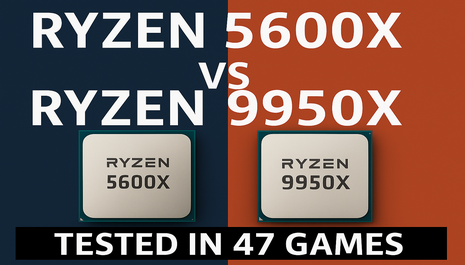
Introduction
Two CPUs, one generation apart in architecture but worlds apart in scale — the Ryzen 5600X and the Ryzen 9950X represent two very different philosophies in AMD’s design timeline. The 5600X was the mainstream king of its era: six cores, superb gaming efficiency, and unbeatable value. The 9950X, on the other hand, is a brute-force flagship built for modern workloads, boasting far higher core counts, larger caches, and higher sustained clocks.
But what happens when you strip away the productivity benchmarks and just look at pure gaming performance? How much faster is the Ryzen 9950X than the Ryzen 5600X?
To find out, I tested 47 games spanning nearly two decades of PC gaming history — from Half-Life 2: Lost Coast (2005) to Black Myth: Wukong (2024) — at both 4K and 8K resolutions.
The results reveal a fascinating story about how game engines have evolved, when CPU power still matters, and when it doesn’t.
Test System
- CPUs: AMD Ryzen 5600X (6 cores, 12 threads) and Ryzen 9950X (16 cores, 32 threads)
- Both CPUs operated at stock settings with default power limits and automatic boost behavior
- GPU: ASUS GeForce RTX 3090 (24 GB GDDR6X)
- Memory: 32 GB DDR5 @ 3600 MHz (dual-channel)
- Storage: NVMe SSD
- Operating System: Windows 11 Pro (latest updates)
- Drivers: NVIDIA Game Ready driver, latest available at the time of testing
Benchmark Conditions
- Resolutions: 3840 × 2160 (4K) for all titles and 7680 × 4320 (8K) where possible
- Presets: Highest available or “Ultra” settings for each title unless otherwise stated
- DLSS / FSR : Disabled
- V-Sync and frame caps: off
- Each result represents the average FPS across identical, repeatable runs
- Only games with built-in or stand-alone benchmark tools were included to ensure consistency and reproducibility
Results Overview
Across 47 titles tested at 4K and 39 at 8K, the Ryzen 9950X delivered an average uplift of +13% at 4K and +4.5% at 8K compared to the Ryzen 5600X.
At 4K, average frame rates rose from 136 FPS on the 5600X to 153 FPS on the 9950X — a modest but measurable gain that reflects improved IPC, cache design, and boost behavior.
At 8K, the difference narrowed to 51.1 → 53.0 FPS, confirming that GPU limitations dominate at ultra-high resolutions.
These results are specific to the RTX 3090 used in this test setup. A faster GPU — for example, an RTX 4090 or newer generation card — would likely expose larger CPU-side differences, especially at lower resolutions or higher frame-rate targets. Conversely, many modern GPU-heavy titles such as Metro Exodus Enhanced, Chernobylite, and Assassin’s Creed Mirage show no measurable improvement at all, as they are completely limited by GPU throughput rather than CPU processing.
Results at 4K Resolution
The table below summarizes the 4K performance for both CPUs.
- The benchmarks are sorted by year
- % Gain is color coded with green being the highest and red being zero gain
- Half Life 2: Lost coast had frame rates capped at 247 FPS – Both CPUs achieved that at 4K so this result has been excluded
- The average FPS across all tests are ~ 136 and ~ 153 for the two CPUs; The 9950X is about 13% faster
- FEAR from 2005 is still a fascinating entry (as always). Even two decades after it’s years it is minimally dependent on raw CPU Power (and highly sensitive to GPU capabilities). Quite remarkable.
- Devil May Cry 4 from 2008 has also been similarly impressive over the years with regards to it being heavily GPU dependent (The remaster from 2015 not so much!).
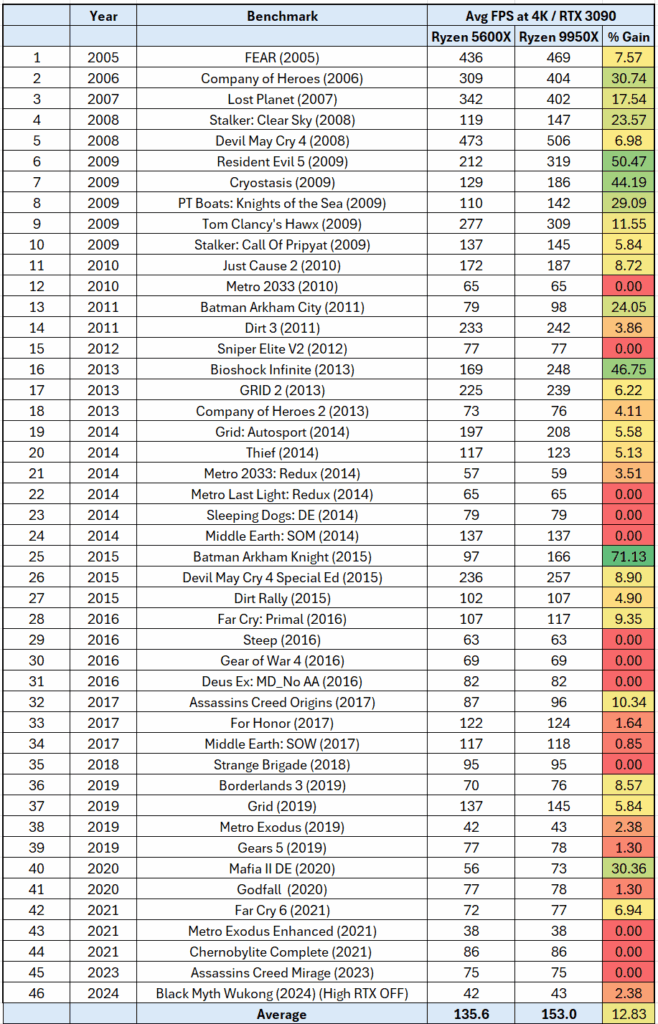
The table below summarizes the 4K performance for both CPUs, sorted by % Gain.
- 16 of the tested titles gain less than 2% going from the 5600X to the 9950X
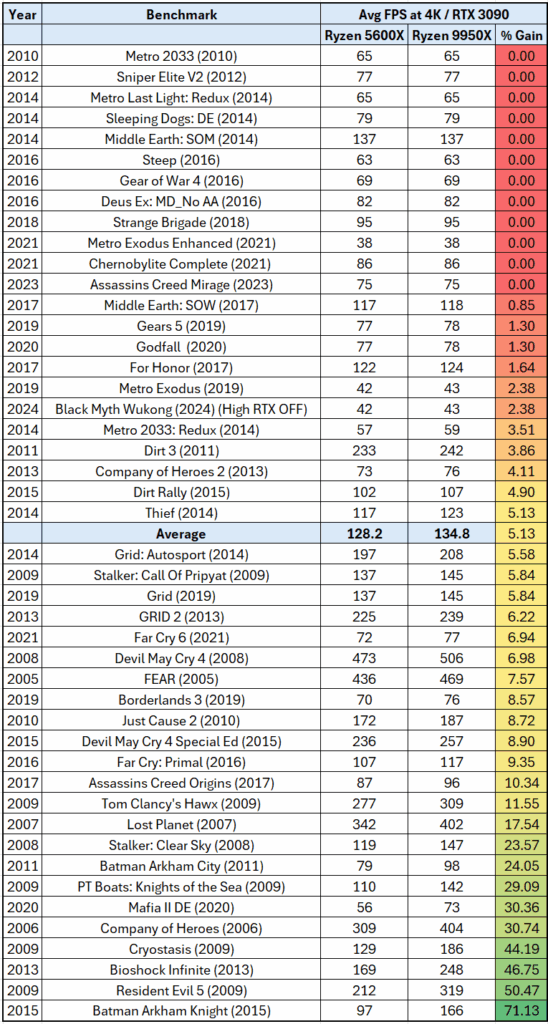
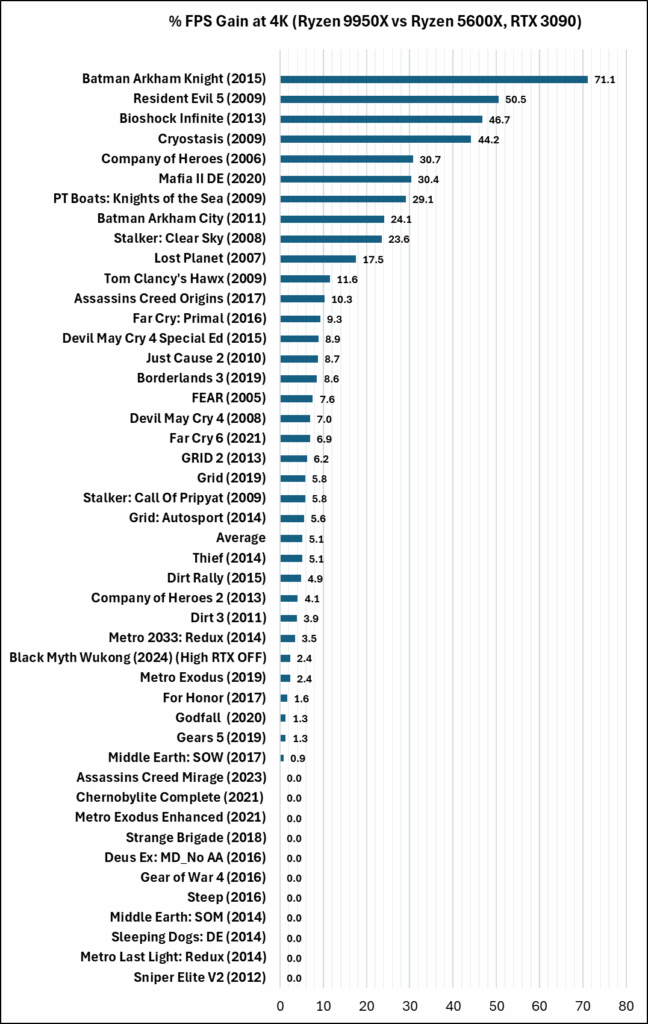
Results at 8K Resolution
When it comes to 8K gaming, a handful of titles (top 4) show surprising gains. Borderlands 3 and Bioshock Infinite behave very unexpectedly with 36 and 44 percent gain in average FPS with the faster CPU.
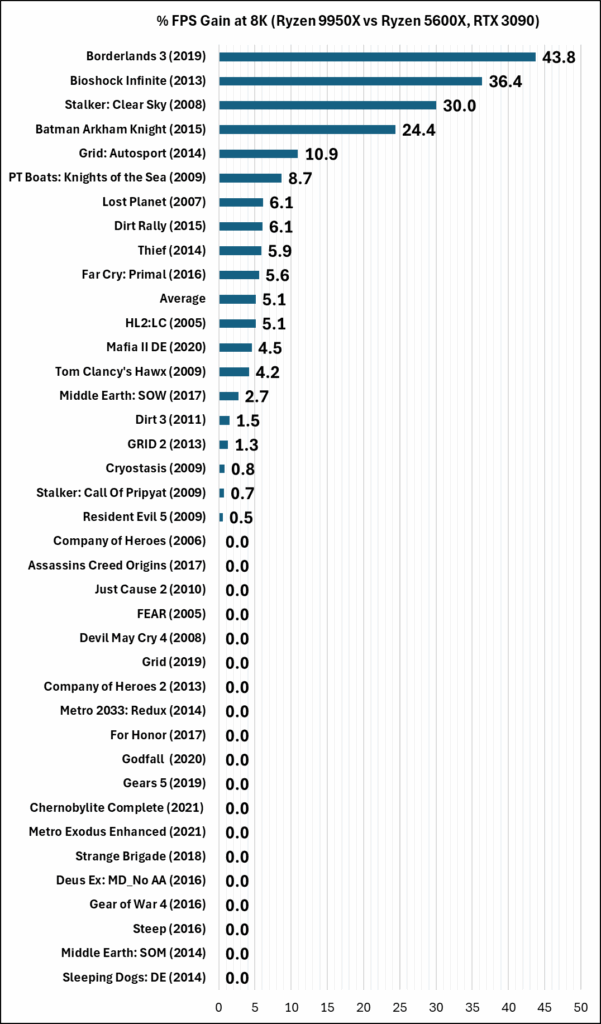
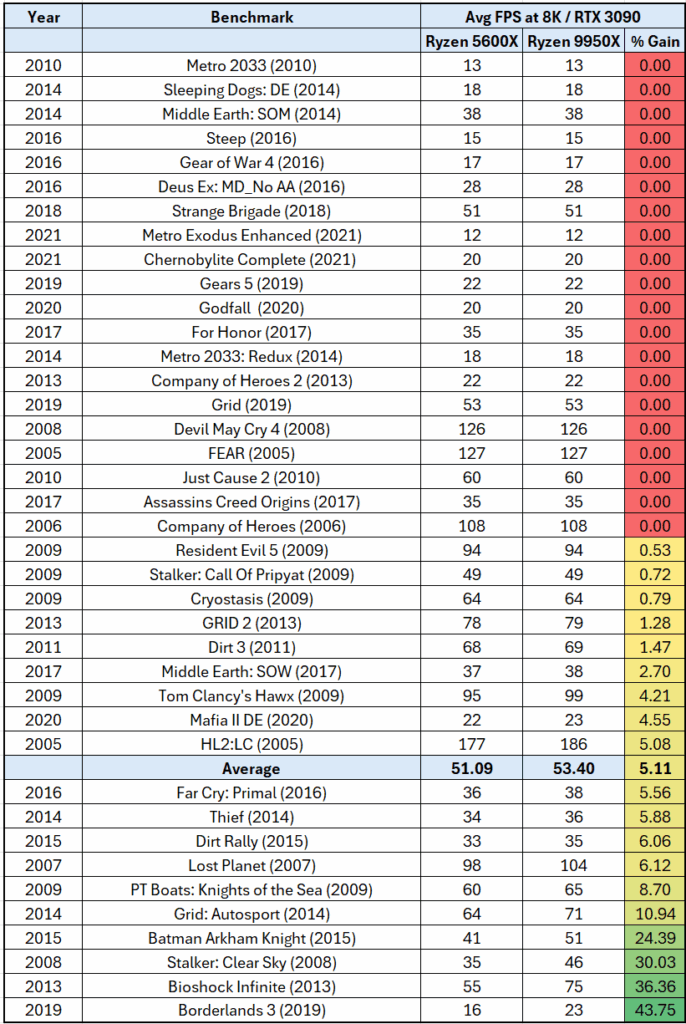
Conclusion
This benchmark comparison highlights how far GPU bottlenecks have come to dominate modern gaming performance. Even with a massive architectural leap from the Ryzen 5600X to the Ryzen 9950X, the improvement in real-world frame rates remains modest — around 13% at 4K and 4–5% at 8K when paired with an RTX 3090.
The data shows that once the GPU becomes the limiting factor, additional CPU power yields diminishing returns. Many recent titles, especially those built on modern engines like Metro Exodus Enhanced or Assassin’s Creed Mirage, are almost completely GPU-bound at high resolutions. In contrast, older or CPU-intensive games — such as Batman: Arkham Knight, Resident Evil 5, and Bioshock Infinite — continue to scale dramatically with faster CPUs.
If you’re gaming primarily at 4K or higher, the Ryzen 5600X still holds up remarkably well. The 9950X demonstrates its advantage only when a faster GPU is introduced, or in CPU-heavy scenarios such as high-refresh gaming, simulation titles, or multitasking while streaming or recording.
It’s also important to note that this analysis focuses on average FPS results. Minimums and 1% low FPS values — which often reflect stutter, frame pacing, and CPU scheduling behavior — can have a greater impact on actual gameplay smoothness. Those deeper metrics could reveal additional benefits for the 9950X, particularly in titles with heavy background processing or open-world asset streaming.
Ultimately, this test underscores just how severe the GPU bottleneck has become in modern gaming. Even with a CPU that is more than twice as capable on paper, frame rates often remain unchanged once the graphics card reaches its throughput limit. The Ryzen 9950X’s advantage lies not in raw FPS averages, but in maintaining consistent performance under demanding, multi-threaded, or multitasking scenarios — a strength that becomes more apparent as future GPUs and engines begin to catch up.

Recent Comments